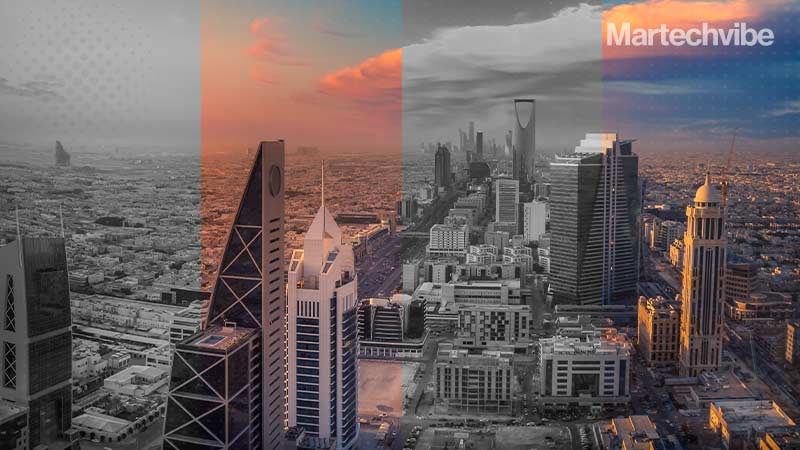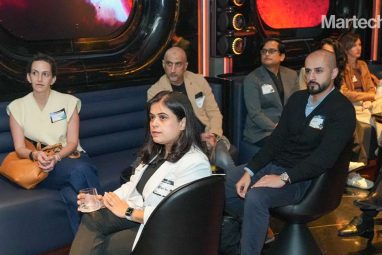State Of Martech In Saudi Arabia
The Kingdom of Saudi Arabia (KSA) is focused on economic diversification — from a natural resource-based economy to an innovation hub powered by technology. The large and growing local population means solid domestic demand for goods, services and infrastructure. As a result, the government is pouring billions of dollars into high-tech infrastructure, launching funds, moving […]
Topics

The Kingdom of Saudi Arabia (KSA) is focused on economic diversification — from a natural resource-based economy to an innovation hub powered by technology. The large and growing local population means solid domestic demand for goods, services and infrastructure. As a result, the government is pouring billions of dollars into high-tech infrastructure, launching funds, moving ahead with many economic reforms to strengthen the digital sector, and making doing business easier.
Post-pandemic, many companies have turned their attention to return and recovery as KSA re-opens parts of its economy and consumer behaviours are settling into a new normal.
Although the pandemic’s impact has varied across the world, three themes have become evident among consumers across the globe:
- Shift to value and essentials: consumers are mindful about their spending
- Flight to digital and omnichannel: many consumers plan to continue shopping online even when brick-and-mortar stores reopen.
- Shock to loyalty: consumers have tried a different brand or shopped at a different retailer during the crisis.
The KSA has consumers of the highest purchasing power and a young, tech-savvy population. Millennials, who make up over a quarter of the population, play a significant role in the nation’s socio-economic development. They are bullish about the economic outlook for their own country, hold a more positive perception of business, and are educated. What’s more, a significant number of millennials in KSA are brand loyal. Such findings of Google and Deloitte Global Millennial Survey represent positive indicators for businesses in the country.
Saudi Arabia is seeing a growth in smartphone penetration. In 2025, the internet penetration in Saudi Arabia is forecasted to reach 97 per cent, up from 84 per cent in 2019. The number of Saudi internet users is forecasted to amount to 36.2 million users in 2025. Millennials are also digital natives, being the first people to grow up with the Internet and digital media. In the KSA, 97.7 per cent are online daily, and 97.8 per cent are on smartphones.
As the Middle East’s largest consumer base, brands need to be asking themselves: How do we attract and engage this market? Needless to say, it presents an opportunity for marketers to bring large volumes of data together from an array of sources and leverage it to create advanced marketing strategies.
The KSA is a champion in innovation and digital disruption. It has been rated as the strongest “digital riser” by the European Centre for Digital Competitiveness. And as companies are moving towards digital marketing, there’s a greater awareness and adoption of marketing technology (MarTech) solutions. The dramatic rise in online activity is expected to increase demand for MarTech from businesses that wish to better understand online consumer behaviour.
According to Gartner’s annual CMO Spend Survey 2020-21, CMOs will allocate 26 per cent of their budgets for MarTech, with two-third expecting investments to increase.
In the Middle East, CMOs are allocating between 10 to 12 per cent of their budgets towards MarTech adoption and integration.
Demand for digital marketing has exponentially accelerated due to the pandemic, and Saudi companies need to target potential new customers online to grow and compete. If brands really want to grow their business, they need to tap into new pockets of consumers, make their product discovered by new consumers, inspire them to buy.
Also Read: Email Marketing Lessons from Fortune 500 Companies
Surge in eCommerce sales
Ecommerce was growing fast before COVID-19, but the pandemic pushed even more Saudi consumers online, with an increase in the adoption of new shopping behaviours such as restaurant and grocery deliveries. Consumers cite convenience and value as the primary reasons for trying new shopping behaviours, according to Mckinsey.
With the launch of Amazon in Saudi Arabia, eCommerce competition has been intensifying, with players focusing on faster delivery and reducing delivery costs.
There was a surge in demand for eCommerce during 2020 as normal shopping habits were upended by the pandemic. Supermarket operator Carrefour’s online orders spiked by 917 per cent in Saudi Arabia from January to June in 2020.
Consumer electronics remains the leader in eCommerce in terms of retail value sales, ahead of apparel and footwear, but FMCG and consumer health saw the most rapid rates of growth in eCommerce retail value sales, according to Euromonitor International.
Experts say the trend may be here to stay. Raghdah Sadiq, marketing supervisor at a Saudi eCommerce platform HNAK.com, told Arab News that “In 2021, consumers have already built a strong habit of ordering online, but for some items such as fashion, jewellery, and groceries, people would prefer to go to the stores and experience shopping offline.”
Also Read: Most Recommended Brands in the UAE, Saudi Arabia and Egypt
Social Commerce is Growing
Social media is hugely popular in Saudi Arabia, with Facebook, Twitter and Instagram ranking among the ten most visited websites in the country. The country ranks third globally in terms of smartphone usage at 24.2m users, with almost three-quarters of the population using smartphones. In fact, Saudi Arabia is the biggest user of YouTube per capita worldwide. It has the highest Twitter penetration in the world at 37 per cent and ranks number seven in the world in terms of the total number of Twitter users.
It has over 19 million social media users, a key target for digital marketers and presents an opportunity for tech-forward marketers. A Facebook survey found that Instagram was best for fashion and food and drink companies, while Facebook was better for gaming campaigns.
For marketers, targeting specific demographics could also reap the rewards. Facebook reported that Nestlé Middle East created a bot on Messenger that recommended products to specific users, with sales increasing 2.9 times over the campaign’s lifetime.
Also Read: Company Closeup: CleverTap – The Platform For Any Mobile App
5G becoming mainstream
There’s a lot of excitement surrounding 5G — and for a good reason. A study conducted in mid-2020 by Opensignal found that the Saudi 5G network was the fastest globally in terms of average download speed. 51 cities and provinces in various regions of Saudi Arabia are covered by 5G services. Improvements offered by 5G give businesses access to lightning-fast data transfer speeds and improved network reliability.
Mobile Marketing
Smartphone penetration is well above 60 per cent of the population in Saudi Arabia. Mobile marketing is in a relatively growing stage in Saudi Arabia. Research by Universiti Sains Malaysia on the effectiveness of mobile marketing in KSA found that over 40 per cent of people find mobile marketing helpful in updating them about products and services they are interested in.
According to Google research, of the smartphone users in Saudi Arabia, 93 per cent notice ads on their mobile phones, 91 per cent of smartphone users watch video on their phones, which gives us insight into why YouTube is so popular and such a great advertising medium in the country and 70 per cent found themselves searching for something they saw in an ad.
These high numbers mean different forms of marketing campaigns that are mobile-friendly can be effective as well. Traditional SMS marketing still works, but new channels that target Arabs while browsing the web or watching a video on their smartphone are just as effective.
Meanwhile, the advertising market continues to witness a major shift toward digital advertising. According to figures from Statista, the Internet took over in 2020 with 44.2 per cent of the total Ad expenditure, while TV is decreasing to 30 per cent. An estimate by Ipsos values the digital advertising market in the Middle East at $1.2 billion in 2019 — 70 per cent to 75 per cent of the digital advertising in the MENA goes to Facebook and Google. The rest of the digital advertising dollar is divided among Twitter, LinkedIn, Snapchat, Tiktok, and other Ad networks.
The trend in the Middle East, including KSA, is:
- Facebook Advertising Network (Facebook, Instagram, WhatsApp)
- Google (YouTube Video Advertising)
The Arabic language is dominating the region when it comes to retail, entertainment, and B2C. Over 95 per cent of the consumers in Saudi Arabia prefer Arabic. Marketers use a bilingual approach for their marketing message and Ads to increase their reach.
Cashless Society
As a result of the pandemic, Saudi consumers are becoming increasingly comfortable making in-person payments and transactions using payment cards and, to a lesser extent, smartphones, as well as e-wallets, at the point of sale. The rate of growth has been phenomenal – from 97 million contactless transactions in 2019 to 266 million during 2020. Businesses are taking advantage of modern payment technologies to better serve their customers — and their bottom line. Ditching cash is helping independent shops keep their head above water in challenging retail conditions.
Investing in the economy
In March, Saudi Arabia’s biggest listed companies, including energy giant Aramco, decided to redirect the money to the local economy as crown prince Mohammed bin Salman tries to get his economic overhaul plan back on track. Twenty-four firms such as Saudi Basic Industries Corp., Almarai Co., Saudi Telecom Co. and National Shipping Co. have agreed to join the plan, contributing $1.33 trillion of domestic capital spending over the next 10 years.
In June, Dubai-based Majid Al Futtaim (MAF) appointed Aecom as lead consultant on its $4.26 billion Mall of Saudi project and opened its first artificial intelligence-enabled, fully automated fulfilment centre in Jeddah, as part of a series of ongoing investments in the market.
MAF plans other investments, including strengthening its distribution network across the kingdom to support e-commerce growth. “I have to say that Saudi Arabia has moved a lot in the last few years in terms of business friendliness,” Alain Bejjani, Majid Al Futtaim Holding chief executive, told The National.
In February, Noon, an online platform backed by Saudi Arabia’s Public Investment Fund (PIF) and Mohamed Alabbar, founder and managing director of Emaar Properties, announced a major launch into the region’s highly competitive food delivery sector. The Noon announcement came hot on the heels of the launch of Kitch; another food delivery service opened in Saudi Arabia by Dubai-based businessman Walid Hajj and Saudi entrepreneur Fahad Alhokair.
Role of Women
Globally, women drive 70-80 per cent of all consumer purchasing, they are the primary shoppers in their homes. In Saudi Arabia, as more women are integrated into the workforce, it’s having a major impact on household income and the economy. Brand and marketers should consider the unique characteristics of Saudi women consumers and the shift in their shopping orientations through effective marketing.
Relevance-led brand building is vital for both evergreen brands and small brands.
Most CPG companies need to sharpen their consumer targeting, enabled by new digital media. This targeting needs to cross all touchpoints and include personalised point-of-sale marketing.
“Saudi Arabia used to have a relatively modest household income because you had just one bread-earner with large families. With better gender equality, we will see the Saudi economy develop and consumption contributing a much higher share of GDP,” Bejjani told The National.
Data, personalisation and AI
In the era of evolved customers, mass marketing campaigns don’t work. With a surge in customer touchpoints and an overload of information and communication, the best way to attract and hold customer’s attention is through personalised communication and customised experience. According to State of Customer Marketing Maturity Middle East, 2020, hyper-personalisation initiatives are picking up, with 19 per cent of marketers reporting they personalise for the segment of one.
Also, data-driven decision-making has perhaps never been more important than it is now. But lack of data literacy remains a significant barrier between organisations. In the Middle East, including Saudi Arabia, customer data usage is still basic, with 57 per cent of marketers working with demographics data only. A significant number (43 per cent), however, are only tracking response rates (opens, clicks).
With growing internet usage in KSA, it’s pertinent for brands to harness insights from the vast amounts of data that consumers create, then need to loop back into innovation priorities and results, maximising the brand’s relevance while keeping the product line focused on an efficient core.
Although data and artificial intelligence (AI) are at the heart of Saudi Arabia’s Vision 2030, and over the next 15 years, investment in AI alone is forecast to add 12.4 per cent to the country’s GDP, the use of AI for predicting customer behaviour is at a nascent stage in the Middle East, with 10 per cent indicating they can predict what customer will buy next, who is likely to churn. Current constraints revolve around top management, lack of awareness and talent to create a business case for new-age marketing. This indicates that the holy grail of target customers at the right time remains elusive with the right message.
To maximise returns from data, marketers need to use analytics and business intelligence to become literate in the language of data. It’s no secret that big data drastically impacts the goals and success of digital marketers, and gaining access to millions of data points is a game-changer.
New Reality
In the post-pandemic, business leaders are thinking about long-term strategic moves, particularly as the “next normal” looks dramatically different from the future they had been planning for. Businesses should follow consumers in their new decision journeys when marketing and communicating. The future belongs to those who can aggregate information and enable better, quicker and more relevant decision making and create great customer experiences. One of the new ways that brands can target Saudi consumers and make sure the message works is to use augmented reality (AR) technology, which was especially advantageous when shoppers could not visit stores during the pandemic.
A Facebook survey found that 88 per cent of Saudi respondents said they had used AR features, while 29 per cent of those on Instagram said they used AR to interact with brands on a weekly basis.
Future of Martech landscape
Martech is worth the investment – engaged customers spend more, stay with you longer and serve as advocates of your brand. The growth that comes from existing customers is more efficient and far more profitable than acquiring new customers. Marketers in KSA, however, need to get their data strategy in place, along with a clear plan to use AI and technology for their marketing campaigns.
Apart from the Big 4 in the marketing suite, Adobe Experience Cloud, Oracle Cloud CX, SAP Marketing Cloud and Salesforce Marketing Cloud, there’s an extensive list of digital marketing companies in KSA, providing digital strategy building, data analytics platforms, social media monitoring, online content analysis and digital customer experience insight. Some of the leading martech solutions providers in the Middle East are HubSpot, Appsflyer, Hootsuite, Sitecore, Sprinklr, Talkwalker, Zoho Social and Tealium that are defining the path to achieving ambitious business and marketing objectives.
Saudi Arabia is brimming with digital marketing opportunities. With over 32 million Internet users in 2020, there is a high demand for online goods and services. Combined with the relatively high GDP per capita of $20,912, and more than 50 per cent of the population under 25 years of age, the country is clearly set to see significant online growth over the coming years. The KSA is leading digital transformation spend in the MENA region, holding over 31 per cent share of the market in 2019. This is expected to continue.
Martech adoption is no longer a choice for business anymore. Social media and big data have been at the forefront in cruising business direction. In Saudi Arabia, businesses face the dilemma of digitalisation while figuring out how to harness customer engagement technology with limited resources and capacity constraints. Businesses need to explore, experiment and engage various business models and shortlist the most suitable ones.
Vaccine rollout for the virus that has caused such damage to the economy does boost confidence that better times are ahead in 2021 in KSA. Over the 2021-2024 period, Fitch Solutions expects recovering government spending, high foreign and domestic investor sentiment and the bold modernisation initiatives related to the landmark Vision 2030 will all support underlying dynamics over the coming years.
The Saudi government has established various multi-billion-dollar initiatives to foster new service verticals, including entertainment, retail, tourism and healthcare, as part of its economic diversification strategy, including the brainchild of Crown Prince Mohammed bin Salman, the new city state of Neom, with an artificial moon and flying taxis. The Ministry of Communications and Information Technology (MCIT) continues to push for digital advancement through partnerships with global tech companies to accelerate the Kingdom’s adoption of digital technologies and branch out into emerging markets.
“Digital transformation is a critical component towards the creation of a vibrant society, a thriving economy, and an ambitious nation, the three key ambitions of Vision 2030,” Dr Ahmed H. Altheneyan, Deputy Minister for Digital Capacities for (MCIT) of Saudi Arabia said in a statement.
Saudi Arabia’s vision for a smart economy relies heavily on digital transformation initiatives, and the ongoing pandemic has been a catalyst to spur the adoption of emerging technologies.









































































































